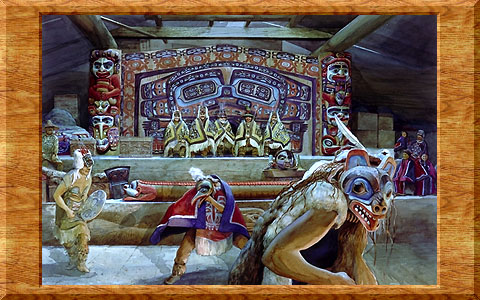
Original watercolour 21" x 29" by Gordon Miller © 1991
The most northerly of the Northwest Coast Indians, the Tlingit, occupy a wild and beautiful coastal area stretching 480 miles along the Alaska panhandle. A proud people, they fiercely defended their villages against the Russians who were the first Europeans to venture into their territory.
The great ceremonial feasts of the First Peoples of the Northwest Coast occurred in winter, following the season of gathering and preserving the abundant food resources of the area. Hundreds of guests would be invited to witness the honouring of the dead, inheritance of names, privileges, and the recording of other important events in family history. Often lasting many days and nights, the potlatch was highlighted by oratory and spectacular theatrical and dance performances. Vast amounts of material goods would be given to guests according to their rank. In this way social status was obtained or confirmed, wealth shared, and an elaborate economy stimulated.
Pictured is the interior of the Whale House in Klukwan. The hosts, wearing Chilkat blankets and surrounded by the family treasures, are seated before a large painting called the "Rain Screen".
The potlatch, with all its magnificent trappings and artistic accomplishment is today in revival throughout the Northwest Coast, along with the cultures and the spirit of the First Peoples.